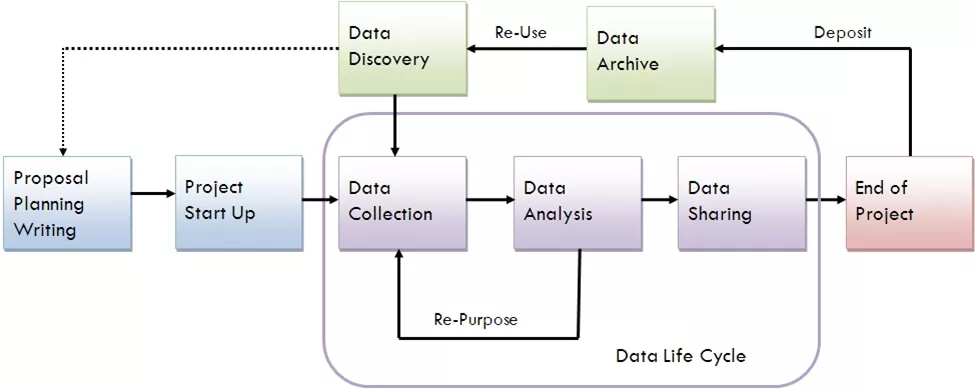Research Data Management
What is RDM?
“Data Management refers to the storage, access and preservation of data produced from a given investigation. Data management practices cover the entire lifecycle of the data, from planning the investigation to conducting it, and from backing up data as it is created and used to long term preservation of data deliverables after the research investigation has concluded…” (CASRAI, n.d.)

Useful Links
- A brief guide to Research Data Management
- Tri-Agency Research Data Management Policy
- Tri-Agency Statement of Principles on Digital Data Management
- Frequently Asked Questions Tri-Agency Research Data Management Policy
Data Management Plan (DMP)
A data management plan (or DMP) is a formal plan that describes how research data are managed throughout the lifecycle of a research project. Planning saves time in the long run by integrating processes within and after the life of a project. It minimizes the need to reorganize, reformat, or attempt to remember details about data when disseminating and sharing with others. Many funding agencies and journals have data management policies and guidelines.
A Data Management Plan will provide the details of:
- How research data will be collected, documented, formatted, stored, protected and shared
- How other datasets will be acquired and used Where data will be deposited
- Who will be responsible for management of the projects data
- Who will assume responsibility if the initial responsible person leaves the project or team
- Roles and responsibilities of the research project team
- Ethical, legal or commercial restrictions that may reduce or prevent sharing options
Useful Links
Data Repositories
“Data deposit” refers to when the research data collected as part of a research project are transferred to a research data repository. The repository should have easily accessible policies describing deposit and user licenses, access control, preservation procedures, storage and backup practices, and sustainability and succession plans.
Tri-Agency Definition
Research Data Repositories 101
A series of modules developed by the Portage Network's Dataverse North Working Group to help users learn about the role that research data repositories play in good research data management (RDM), and in meeting the requirements of the Tri-Agency RDM Policy. These modules will help researchers learn about different types of research data repositories, policies and practices that affect these repositories, and what they should consider when choosing a repository in which to deposit their data. There are seven modules in this series:
- Module 1: Background and Learning Objectives
- Module 2: What are Research Data Repositories?
- Module 3: Types of Research Data Repositories
- Module 4: TRUST and FAIR Principles for Research Data Repositories
- Module 5: Research Data Policies Landscape: Funders’, Publishers’, and Institutional
- Module 6: Glossary of Terms
- Module 7: Test Your Knowledge!


